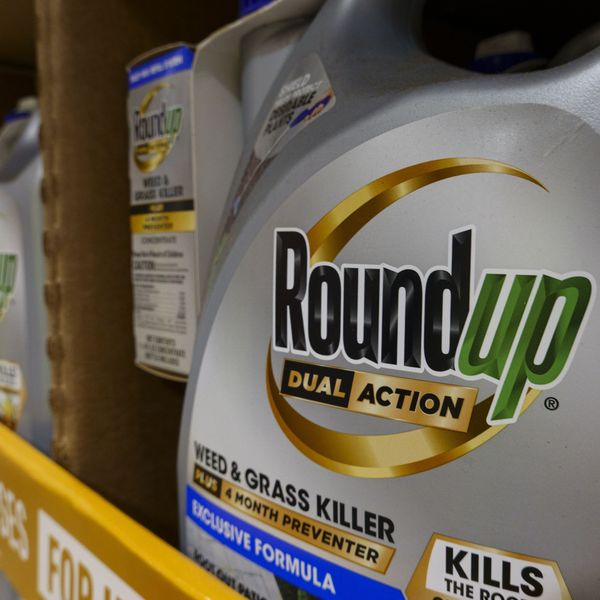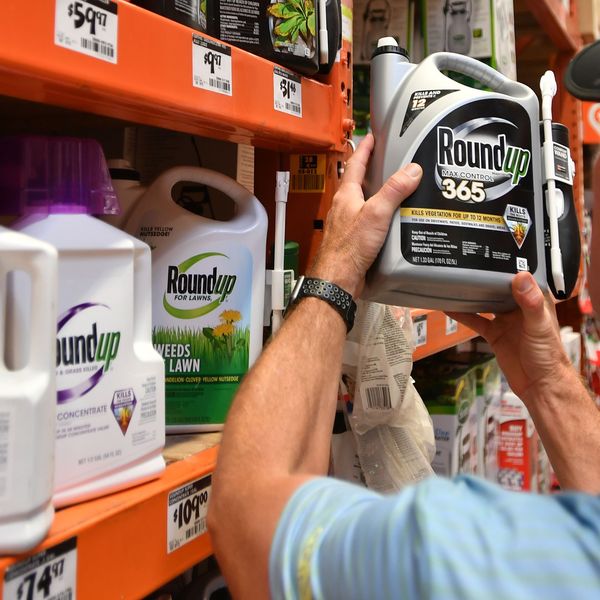Corporate Win: Supreme Court Says Monsanto Has 'Control Over Product of Life'
Indiana farmer must pay agribusiness giant $84,000 for patent infringement
The U.S. Supreme Court ruled Monday in favor of biotech giant Monsanto, ordering Indiana farmer Vernon Hugh Bowman, 75, to pay Monsanto more than $84,000 for patent infringement for using second generation Monsanto seeds purchased second hand--a ruling which will have broad implications for the ownership of 'life' and farmers' rights in the future.
In the case, Bowman had purchased soybean seeds from a grain elevator--where seeds are cheaper than freshly engineered Monsanto GE (genetically engineered) seeds and typically used for animal feed rather than for crops. The sources of the seeds Bowman purchased were mixed and were not labeled. However, some were "Roundup Ready" patented Monsanto seeds.
The Supreme Court Justices, who gave Monsanto a warm reception from the start, ruled that Bowman had broken the law because he planted seeds which naturally yielded from the original patented seed products--Monsanto's policies prohibit farmers from saving or reusing seeds from Monsanto born crops.
Farmers who use Monsanto's seeds are forced to buy the high priced new seeds every year.
Ahead of the expected ruling, Debbie Barker, Program Director for Save Our Seeds (SOS), and George Kimbrell, staff attorney for Center for Food Safety (CFS), asked in an op-ed earlier this year, "Should anyone, or any corporation, control a product of life?":
Bowman vs. Monsanto Co. will be decided based on the court's interpretation of a complex web of seed and plant patent law, but the case also reflects something much more basic: Should anyone, or any corporation, control a product of life?
[Monsanto's] logic is troubling to many who point out that it is the nature of seeds and all living things, whether patented or not, to replicate. Monsanto's claim that it has rights over a self-replicating natural product should raise concern. Seeds, unlike computer chips, for example, are essential to life. If people are denied a computer chip, they don't go hungry. If people are denied seeds, the potential consequences are much more threatening.
Bowman had argued that he was respecting his contract with Monsanto, purchasing directly from them each year, but couldn't afford Monsanto's high prices for his riskier late season crops. Bowman's defense argued that Monsanto's patent was "exhausted" through the process of natural seed reproduction and no longer applied to Bowman's second generation seeds.
"If they don't want me to go to the elevator and buy that grain," Bowman had stated, "then Congress should pass a law saying you can't do it."
The Center for Food Safety released a report in February which shows three corporations control more than half of the global commercial seed market.
As a result, from 1995-2011 the average cost to plant 1 acre of soybeans rose 325%.
As AP reports, more than 90 percent of American soybean farms use Monsanto's "Roundup Ready" seeds, which first came on the market in 1996.
Vandana Shiva, an expert on seed patents and their effects on farmers around the world, wrote recently:
Monsanto's concentrated control over the seed sector in India as well as across the world is very worrying. This is what connects farmers' suicides in India to Monsanto vs Percy Schmeiser in Canada, to Monsanto vs Bowman in the US, and to farmers in Brazil suing Monsanto for $2.2 billion for unfair collection of royalty.
Through patents on seed, Monsanto has become the "Life Lord" of our planet, collecting rents for life's renewal from farmers, the original breeders.
_______________________
An Urgent Message From Our Co-Founder
Dear Common Dreams reader, The U.S. is on a fast track to authoritarianism like nothing I've ever seen. Meanwhile, corporate news outlets are utterly capitulating to Trump, twisting their coverage to avoid drawing his ire while lining up to stuff cash in his pockets. That's why I believe that Common Dreams is doing the best and most consequential reporting that we've ever done. Our small but mighty team is a progressive reporting powerhouse, covering the news every day that the corporate media never will. Our mission has always been simple: To inform. To inspire. And to ignite change for the common good. Now here's the key piece that I want all our readers to understand: None of this would be possible without your financial support. That's not just some fundraising cliche. It's the absolute and literal truth. We don't accept corporate advertising and never will. We don't have a paywall because we don't think people should be blocked from critical news based on their ability to pay. Everything we do is funded by the donations of readers like you. Will you donate now to help power the nonprofit, independent reporting of Common Dreams? Thank you for being a vital member of our community. Together, we can keep independent journalism alive when it’s needed most. - Craig Brown, Co-founder |
Jacob Chamberlain is a former staff writer for Common Dreams. He is the author of Migrant Justice in the Age of Removal. His website is www.jacobpchamberlain.com.
The U.S. Supreme Court ruled Monday in favor of biotech giant Monsanto, ordering Indiana farmer Vernon Hugh Bowman, 75, to pay Monsanto more than $84,000 for patent infringement for using second generation Monsanto seeds purchased second hand--a ruling which will have broad implications for the ownership of 'life' and farmers' rights in the future.
In the case, Bowman had purchased soybean seeds from a grain elevator--where seeds are cheaper than freshly engineered Monsanto GE (genetically engineered) seeds and typically used for animal feed rather than for crops. The sources of the seeds Bowman purchased were mixed and were not labeled. However, some were "Roundup Ready" patented Monsanto seeds.
The Supreme Court Justices, who gave Monsanto a warm reception from the start, ruled that Bowman had broken the law because he planted seeds which naturally yielded from the original patented seed products--Monsanto's policies prohibit farmers from saving or reusing seeds from Monsanto born crops.
Farmers who use Monsanto's seeds are forced to buy the high priced new seeds every year.
Ahead of the expected ruling, Debbie Barker, Program Director for Save Our Seeds (SOS), and George Kimbrell, staff attorney for Center for Food Safety (CFS), asked in an op-ed earlier this year, "Should anyone, or any corporation, control a product of life?":
Bowman vs. Monsanto Co. will be decided based on the court's interpretation of a complex web of seed and plant patent law, but the case also reflects something much more basic: Should anyone, or any corporation, control a product of life?
[Monsanto's] logic is troubling to many who point out that it is the nature of seeds and all living things, whether patented or not, to replicate. Monsanto's claim that it has rights over a self-replicating natural product should raise concern. Seeds, unlike computer chips, for example, are essential to life. If people are denied a computer chip, they don't go hungry. If people are denied seeds, the potential consequences are much more threatening.
Bowman had argued that he was respecting his contract with Monsanto, purchasing directly from them each year, but couldn't afford Monsanto's high prices for his riskier late season crops. Bowman's defense argued that Monsanto's patent was "exhausted" through the process of natural seed reproduction and no longer applied to Bowman's second generation seeds.
"If they don't want me to go to the elevator and buy that grain," Bowman had stated, "then Congress should pass a law saying you can't do it."
The Center for Food Safety released a report in February which shows three corporations control more than half of the global commercial seed market.
As a result, from 1995-2011 the average cost to plant 1 acre of soybeans rose 325%.
As AP reports, more than 90 percent of American soybean farms use Monsanto's "Roundup Ready" seeds, which first came on the market in 1996.
Vandana Shiva, an expert on seed patents and their effects on farmers around the world, wrote recently:
Monsanto's concentrated control over the seed sector in India as well as across the world is very worrying. This is what connects farmers' suicides in India to Monsanto vs Percy Schmeiser in Canada, to Monsanto vs Bowman in the US, and to farmers in Brazil suing Monsanto for $2.2 billion for unfair collection of royalty.
Through patents on seed, Monsanto has become the "Life Lord" of our planet, collecting rents for life's renewal from farmers, the original breeders.
_______________________
Jacob Chamberlain is a former staff writer for Common Dreams. He is the author of Migrant Justice in the Age of Removal. His website is www.jacobpchamberlain.com.
The U.S. Supreme Court ruled Monday in favor of biotech giant Monsanto, ordering Indiana farmer Vernon Hugh Bowman, 75, to pay Monsanto more than $84,000 for patent infringement for using second generation Monsanto seeds purchased second hand--a ruling which will have broad implications for the ownership of 'life' and farmers' rights in the future.
In the case, Bowman had purchased soybean seeds from a grain elevator--where seeds are cheaper than freshly engineered Monsanto GE (genetically engineered) seeds and typically used for animal feed rather than for crops. The sources of the seeds Bowman purchased were mixed and were not labeled. However, some were "Roundup Ready" patented Monsanto seeds.
The Supreme Court Justices, who gave Monsanto a warm reception from the start, ruled that Bowman had broken the law because he planted seeds which naturally yielded from the original patented seed products--Monsanto's policies prohibit farmers from saving or reusing seeds from Monsanto born crops.
Farmers who use Monsanto's seeds are forced to buy the high priced new seeds every year.
Ahead of the expected ruling, Debbie Barker, Program Director for Save Our Seeds (SOS), and George Kimbrell, staff attorney for Center for Food Safety (CFS), asked in an op-ed earlier this year, "Should anyone, or any corporation, control a product of life?":
Bowman vs. Monsanto Co. will be decided based on the court's interpretation of a complex web of seed and plant patent law, but the case also reflects something much more basic: Should anyone, or any corporation, control a product of life?
[Monsanto's] logic is troubling to many who point out that it is the nature of seeds and all living things, whether patented or not, to replicate. Monsanto's claim that it has rights over a self-replicating natural product should raise concern. Seeds, unlike computer chips, for example, are essential to life. If people are denied a computer chip, they don't go hungry. If people are denied seeds, the potential consequences are much more threatening.
Bowman had argued that he was respecting his contract with Monsanto, purchasing directly from them each year, but couldn't afford Monsanto's high prices for his riskier late season crops. Bowman's defense argued that Monsanto's patent was "exhausted" through the process of natural seed reproduction and no longer applied to Bowman's second generation seeds.
"If they don't want me to go to the elevator and buy that grain," Bowman had stated, "then Congress should pass a law saying you can't do it."
The Center for Food Safety released a report in February which shows three corporations control more than half of the global commercial seed market.
As a result, from 1995-2011 the average cost to plant 1 acre of soybeans rose 325%.
As AP reports, more than 90 percent of American soybean farms use Monsanto's "Roundup Ready" seeds, which first came on the market in 1996.
Vandana Shiva, an expert on seed patents and their effects on farmers around the world, wrote recently:
Monsanto's concentrated control over the seed sector in India as well as across the world is very worrying. This is what connects farmers' suicides in India to Monsanto vs Percy Schmeiser in Canada, to Monsanto vs Bowman in the US, and to farmers in Brazil suing Monsanto for $2.2 billion for unfair collection of royalty.
Through patents on seed, Monsanto has become the "Life Lord" of our planet, collecting rents for life's renewal from farmers, the original breeders.
_______________________

